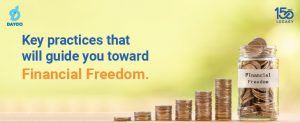Achieve Financial Independence with These 7 Habits
![]() November 5, 2024
November 5, 2024
![]() 0 Comments
0 Comments
For most people, financial freedom is something to be desired, but very few work toward it. It is not about amassing wealth; instead, it is about living a lifestyle that your finances can sustain and support in how you really want to live. To some, it may mean early retirement; to others, it could be being able to pursue your passion and not worry about the income that will be generated or just the ability to make choices without worrying about the money. The journey to financial independence may look overwhelming, but proper habits can help in building gradual financial security for that independence.
Good financial habits will empower your journey. Your financial wellness is just like any other discipline: the outcome of constant efforts and smart choices. Practices like budgeting, proper setting of financial goals, and getting an early start with your investments set up a future where money can become a source of empowerment rather than stress. These are habits not only to save more but to live smarter and have your money work for you on your way to attain financial freedom.
Budgeting: The Foundation of Financial Independence
Budgeting is the foundation of financial freedom. It is the discipline by which a you align your spending to make sure every rupee made has a purpose. Sticking to a budget, therefore, means you can manage your finances quite effectively. This implies taming impulse buys and ensures continuous saving toward your goals. A good budget will help you set spending priorities in line and develop a disciplined way of saving—a principle factor in realizing financial freedom.
Set Your Financial Goals
Goal setting allows your money to have a purpose and a direction. Financial independence is itself a goal, though very much for everyone, it must be so. For others, that could mean having a safety net so they can pursue a passion without worrying about income. You have to be specific and clear about what financial independence means to you. It could be to create a corpus that takes care of your bare expenses or to set up an investment portfolio that will generate enough passive income; whatever the goal may be, it will lead your financial decisions and stay focused on your way to independence.
Start Early
The earlier you get started, the more you can benefit from the magic of compounding. Compounding means that your investments generate earnings, which earn their own earnings in turn. It's how a snowball effect can do wonders to your wealth over time. Getting an early start allows your investments more time to grow. This simply means that it lets compounding do its magic in bringing you closer to financial independence.
Build an Emergency Fund
An emergency fund provides your financial safety net. That way, you will not be induced into redeeming your investments prematurely and will instead give them time to grow. Having an emergency fund also means that you are less likely to take on debt when unexpected expenses do crop up. Ideally, it should cover at least six months of your essential and obligatory expenses. Put this money in a vehicle that is liquid and easy to access. This will ensure that you are able to turn to it quickly for your needs without incurring penalties.
Automate
One of the simplest ways to ensure that you’re saving and investing consistently is to automate the process. Setting up automatic transfers to your savings or investment accounts takes the decision-making out of the equation, ensuring that you’re regularly putting money towards your financial goals. Systematic Investment Plans (SIPs) in mutual funds are a great example of automation that can help you stay disciplined and avoid the temptation to spend rather than save.
Keep Debt to a Minimum
Debt can be a double-edged sword. While proper leverage through debt can be powerful and help you achieve financial goals faster, excessive debt—especially from personal loans and credit cards—can be detrimental. Keeping your debt to a minimum ensures that you’re not burdened by high-interest payments, which can derail your progress toward financial independence. Focus on paying off high-interest debt quickly and avoid taking on new debt unless it's for something that will appreciate in value or generate income.
Ensure Proper Insurance Coverage
Having the right insurance coverage is a crucial part of your financial health. Health and life insurance protect you and your loved ones from unexpected events that could otherwise be financially devastating. Without adequate insurance, an illness or accident could wipe out your savings or force you into debt. Ensure you have sufficient health and life insurance coverage to protect your financial independence and give you peace of mind.
Financial independence is not gained overnight; it's a process to be pursued with dedication, discipline, and smart financial habits. With effective budgeting, clear goals, an early start, an emergency fund, automated savings, wise management of debt, and proper insurance coverage, you set yourself in a way to fend off financial pressures. Start building such habits right now, and you will have the sensation of being closer to financial freedom than ever.
-Nischay Avichal
Share With
I'm a cool paragraph that lives inside of an even cooler modal. Wins!
Are you sure?
In case you didnt know, you can open your account online within 24 hours. Offline account opening takes up to 4 working days. If you wish to open your account offline, fill and sign the forms using a black/blue ballpoint pen. Please fill in the email and mobile number of the applicant to avoid account opening delays.
Enter Password
Please enter your details and password
New to Dayco?
Enter Password
Please enter your details and password
New to Dayco?
Filing Complaints on SCORES (SEBI) – Easy & Quick
- Register on SCORES Portal (SEBI)
- Mandatory details for filing complaints on SCORES:
- Name, PAN, Address, Mobile Number, E-mail ID
- Benifits:
- Effective Communication
- Speedy redressal of the grievances
Thanks !!
Your details were successfully received.

Thank you for Your Feedback!
Our Team is working constantly on improving our user experience and your feedback really means a lot.
Thanks !!
App Link Send to your mobile number successfully.
Thank You
All your Questions have been recorded
Thank You
All your Questions have been recorded
Thank You!
Thank you for your response. We'll get in touch with you at the earlisest for your investment planning needs
NEXT
Thank You!
Thank You for your interest in our Moderate Equity Portfolio. Please find below the credentials to track this portfolio:
User ID: mockmod@daycoindia.com
Password: abcd@1234
Portfolio Tracker
Please Read!
Risk profiling is crucial for identifying and managing potential risks in investment decisions. Please carry out your risk profiling before making any investment decisions.
Complete Risk Assessment Now
Thank You !!
Please enter your details to download/print the report
Thank You !!
Please enter your details to download/print the report
Thank You !!
Please enter your details to download/print the report
Thank You !!
Please enter your details to download/print the report
Thank You !!
Please enter your details to download/print the report
Set Your Goal
Please Select an option from below
Set Your Goal
Please Select an option from below
Thanks You !
We appreciate your interest in our services. Our team will be in touch with you shortly.
CloseSet your Goal
Please enter your details in the fields provided
Thanks You!!
Calculation report has been sent to your mail id successfully
Clear form?
This will remove your answers from all questions and cannot be undone.



 Book Appointment
Book Appointment









Leave a Reply